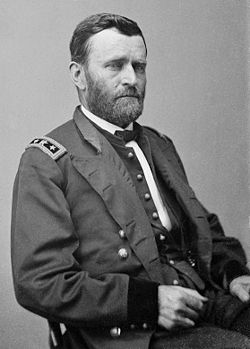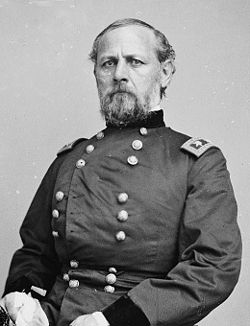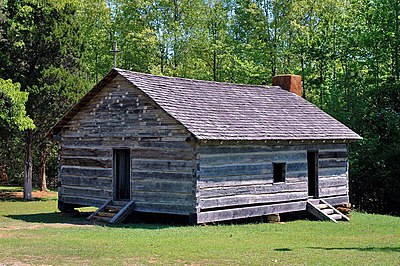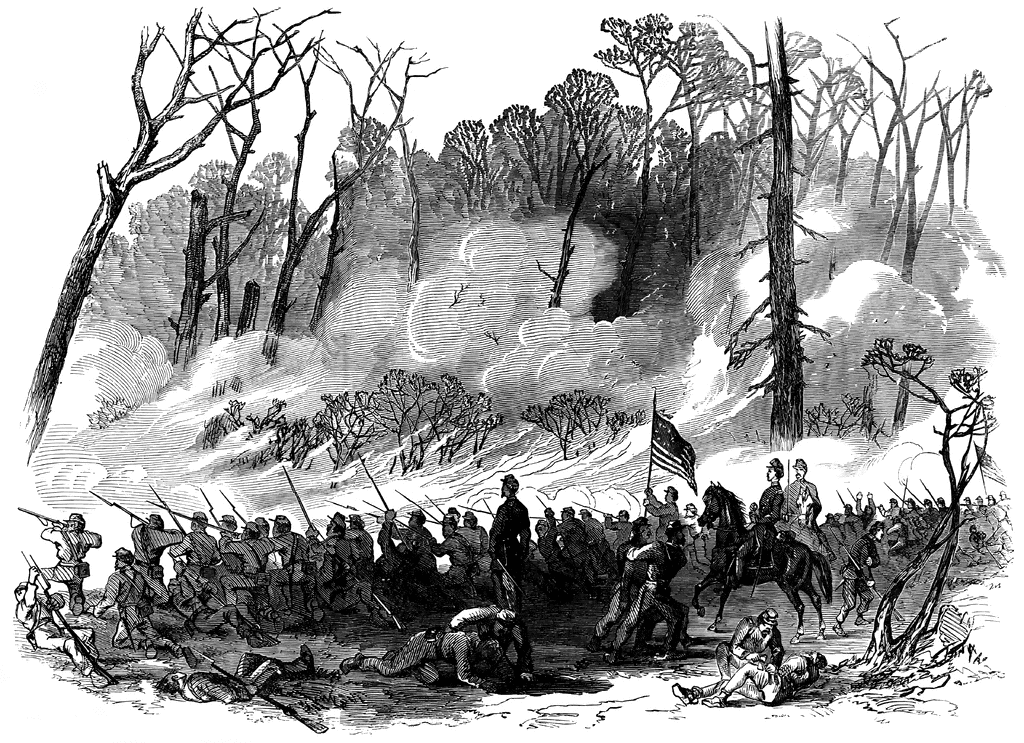 |
| Grant |
At 7:00 on April 7th, 150 years ago today, Grant and Buell advanced against the Confederate lines. The Confederates were surprised by this. They thought the Yankees were disorganized from the beating they had taken the day before, and were not prepared for an offensive. They gave ground rapidly, but as they approached the Peace Orchard and Shiloh church their resistance stiffened. Beauregard worked to get the Confederate line in order. He put Hardee on the right, then Breckinridge, Polk and Bragg. As Johnston had done the day before, he rode the lines, trying to inspire the men with his personal example.
Although the Confederates were no longer being driven back, they were barely holding on, and it was clear they could make no serious counter attacks. They were tired and greatly outnumbered. Beauregard's chief of staff asked him this, "General, do you not think our troops are very much in the condition of a lump of sugar thoroughly soaked in water - preserving its original shape, though ready to dissolve? Would it not be judicious to get away with what we have?" "I intend to withdraw in a few moments" Beauregard replied. He sent out orders, and a retrograde movement began. The retreat was managed very well. They did not panic, and took time to gather up the captured supplies and weapons. By 4:00 they were in retreat, with Breckinridge remaining as a rear-guard.
 |
| Buell |
Grant did not pursue that day. The battle of Shiloh was over. The losses on both sides had been tremendous. The Union had lost 1754 killed, 8408 wounded, 2885 captured, just over 13,000 total. Confederates had 1723 killed, 8012 wounded, 959 missing, for a total of 10,600. One out of four of the 100,000 men who had entered this battle had been killed, wounded or captured. This was an incredibly costly battle. In two days about the same number of men had been lost as in the War for Independence, War of 1812, and Mexican War combined. And after all these deaths, the armies returned to the positions from which they had started, with nothing changed except the loss of many of their comrades. Both sides had proved that they could stand up and fight like professional soldiers. It had been shown in the West, like the East, that the War would be not over soon. It would be a long, drawn out struggle.
 |
| Shiloh Church, Confederate Headquarters |
Grant later wrote this:
"Up to the battle of Shiloh I, as well as thousands of other citizens, believed that the rebellion against the Government would collapse suddenly and soon, if a decisive victory could be gained over any of its armies. Donelson and Henry were such victories. An army of more than 21,000 men was captured or destroyed. Bowling Green, Columbus and Hickman, Kentucky, fell in consequence, and Clarksville and Nashville, Tennessee, the last two with an immense amount of stores, also fell into our hands. The Tennessee and Cumberland rivers, from their mouths to the head of navigation, were secured. But when Confederate armies were collected which not only attempted to hold a line farther south, from Memphis to Chattanooga, Knoxville and on to the Atlantic, but assumed the offensive and made such a gallant effort to regain what had been lost, then, indeed, I gave up all idea of saving the Union except by complete conquest."Both sides claimed victory, but the North was the real victor as they had beaten back the Confederate attacks. The Confederates had been closed to victory. If they had not lost a few days on the march to Shiloh, they may have been able to finish off Grant before Buell arrived. Grant and Sherman made serious mistakes. Sherman did not investigate the rumors of a force in the front, allowing Grant to be surprised. Many politicians wanted Lincoln to remove Grant, saying all he did was get men killed, and only won because others got him out of trouble. There were many rumors that Grant continued his habit of drunkenness that had gotten him dismissed from the army before the war. But reportedly when some politicians asked that he be removed because of it, Lincoln refused saying, "Well you needn't waste your time getting proof; you just find out, to oblige me, what brand of whiskey Grant drinks, because I want to sent a barrel of it to each one of my generals." Lincoln recognized that Grant had is problems, but he valued the fact that he moved quickly and got things done.




0 comments:
Post a Comment